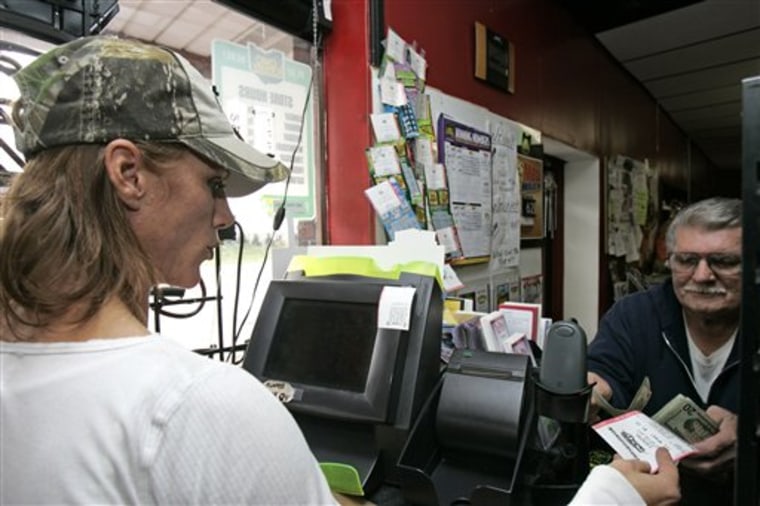Congressional Democrats pushed forward Thursday with a rescue package to pump $25 billion in new emergency loans into U.S. automakers, but a top senator said the package lacked the support to pass.
Senior Democrats are drafting legislation that would carve out part of the $700 billion Wall Street bailout for loans to the three major U.S. auto companies in exchange for a government ownership stake in the companies. They hope to push the measure through during a postelection session of Congress next week.
But the idea is running into resistance from congressional Republicans and President George W. Bush, who are reluctant to back any additional money for the struggling auto industry.
"Right now, I don't think there are the votes. I don't know of a single Republican who's willing to support" the auto bailout, said Sen. Chris Dodd, D-Conn., the chairman of the Senate Banking Committee. Dodd, who said he personally backed the idea, cautioned against "bringing up a proposition that might fail," and appeared to suggest that Congress wait until President-elect Barack Obama is sworn in on Jan. 20 to provide further help to the carmakers.
The financial industry bailout already gives the government power to help the auto industry, Dodd said, and "under an Obama administration, there seems to be a greater willingness to deal with the issue."
He said his panel would hold hearings early next week on an auto bailout.
Rep. Barney Frank, D-Mass., chairman of the House Financial Services Committee, and Sen. Carl Levin, D-Mich., meanwhile, are working on a loan package as General Motors Corp., Ford Motor Co. and Chrysler LLC lobby feverishly for Congress to approve the aid, citing an economic downturn that has choked off auto sales and frozen credit.
GM, the nation's largest automaker, posted a $2.5 billion quarterly loss Friday and has predicted it could run out of cash by the end of the year without government help.
"The reason why the autos are in this challenge is because of the meltdown in the financial market," Michigan Gov. Jennifer Granholm said. "They were on a restructuring path — yes, they were challenged — but this has utterly kicked them in the gut and is strangling them because they can't borrow money."
House Speaker Nancy Pelosi, D-Calif., and Senate Majority Leader Harry Reid, D-Nev., last week called for immediate action to help the auto industry. But Pelosi has yet to schedule a legislative session next week, as leaders continue to hunt for the votes to pass such a bill. Reid already has set a Senate session beginning Monday to deal with other business, and an auto industry bailout vote is a possible addition to the schedule.
House Republican leader John Boehner of Ohio said Thursday he would oppose any such measure. "Spending billions of additional federal tax dollars with no promises to reform the root causes crippling automakers' competitiveness around the world is neither fair to taxpayers nor sound fiscal policy," Boehner said.
Boehner noted that Congress had already approved a separate $25 billion loan program to help automakers develop fuel-efficient vehicles. He questioned "what assurances will Democrats give taxpayers about their chances of getting their auto bailout money back?"
The legislation could set up a faceoff during the president's final days in office.
Bush is open to helping the industry, the White House says, but the administration has expressed reservations about using the bailout money beyond the financial sector.
Treasury Secretary Henry Paulson said Wednesday that the auto sector was "critical" but that the financial industry rescue was not designed for car companies. "Any solution has got to be leading to long-term viability" for auto companies, Paulson said.
Republicans in the Senate will play a key role in whether the rescue plan advances. Some Senate Republicans who opposed the Wall Street bailout before the election have expressed skepticism that the aid would lead to changes for the companies.
Senate Republican leader Mitch McConnell of Kentucky, which is home to two Ford Motor Co. plants, was noncommittal about additional aid. In a statement, his spokesman said Congress should move to speed the release of a $25 billion loan program passed earlier to help the carmakers develop fuel-efficient vehicles.
But Sen. George Voinovich, R-Ohio, who co-chairs the Senate Auto Caucus, said through a spokesman Thursday that he would support using bailout money to assist the companies because "helping the automakers remain viable is truly putting Main Street over Wall Street."
Frank's legislation would carve out a portion of the $700 billion financial rescue program for the Big Three automakers, letting the government take an equity stake in them in exchange for the loans.
The Treasury could take warrants to share in a portion of future profits and would have to be paid back before any other shareholder. The car companies would face tougher restrictions on awarding pay packages to executives and dividends to their shareholders than the financial companies that get a piece of the original bailout.
Auto executives, labor leaders and other industry proponents are seeking an immediate $25 billion loan to keep the companies operating. Union officials are also hoping for a separate $25 billion to help cover future health care obligations for retirees and their dependents.
Frank's panel is scheduled to hear from Detroit auto executives and the United Auto Workers at a hearing next Wednesday.
